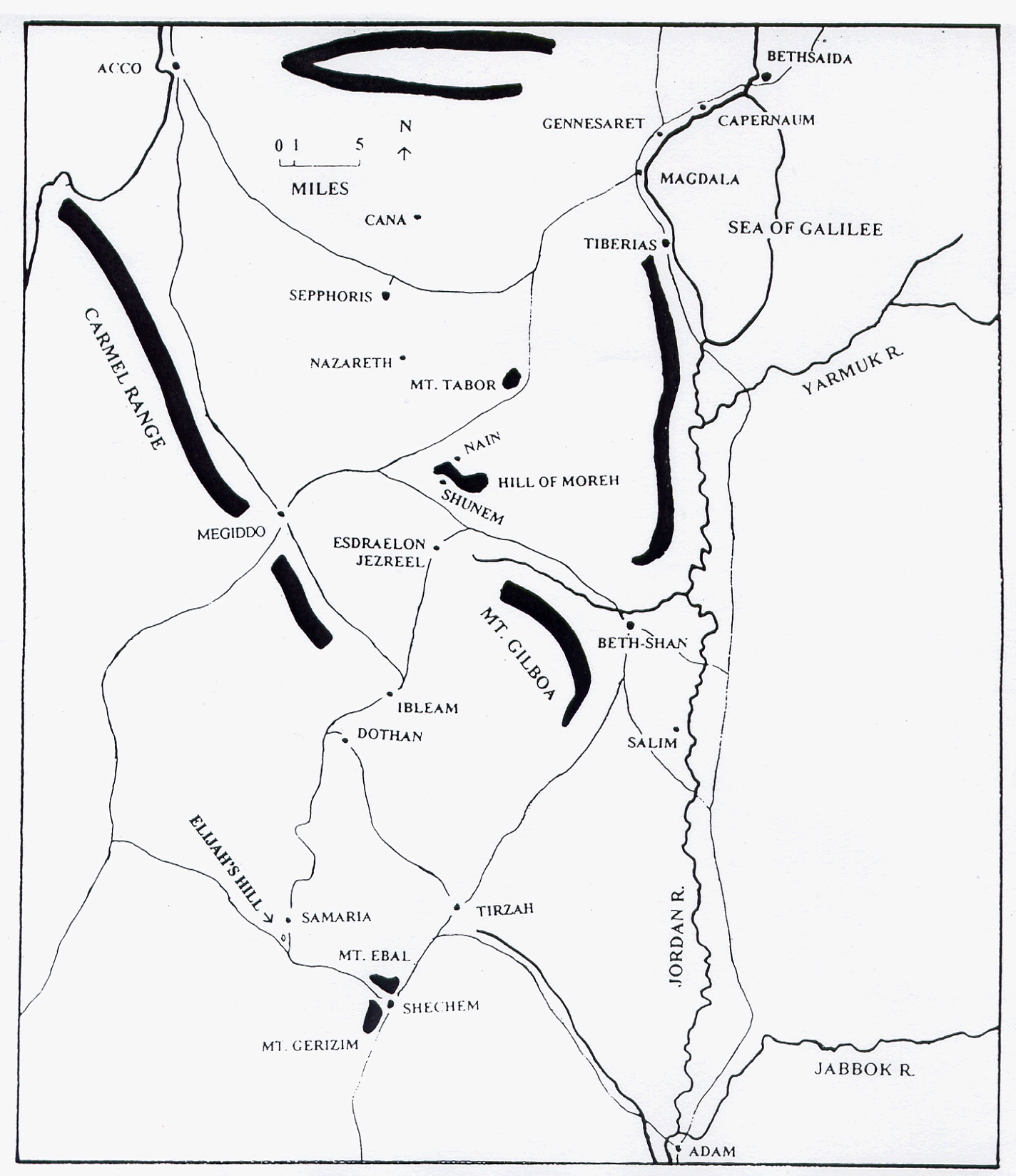19 – Woman at the Well
Where: Jacob’s well, Samaria
Scripture:
Notes:
Listen to audio
When John and his disciples traveled south on Monday May 10, Jesus journeyed west, up the Wadi Farah, toward Shechem. Jesus and his disciples arrived at “Jacob’s well” around noon. Two miles to the southwest is Mount Gerizim with Mount Ebal being two miles to the northwest. Between these twin sacred mountains was ancient Shechem. It was here that Joseph had purchased land and was buried. One mile north of “Jacob’s well” was the town of Sychar, which Jesus had passed on his way to the well.
Jesus expected to get some water at the well, pass through Shechem, and proceed north to Nazareth. Jesus sat down near the well to rest while his disciples went into nearby Shechem to buy some food and to “check out” the situation. It was not always safe for a person that followed the Jerusalem cult, to travel through Shechem.
Around noon, while Jesus was resting, a local woman came to draw water from the well. Since Jesus had no “rope and skin” to let down the 100 feet to draw up water, he asked her for some water. She drew him some water and then boldly expressed her surprise that he, a Jew associated with the Jerusalem Temple cult, would even speak to a Samaritan, much less to a woman, and much less to drink water drawn by “unclean” equipment.
This was the regional headquarters of the Samaritans. They were Jews of mixed ancestry. They were descended from the 10 tribes of Israel, and their foreign mates, that had been resettled into the region back in the time of the Assyrians [around 721 BC]. They rejected the Jerusalem Temple and the cult that surrounded it. They had their own temple on Mount Gerizim and had their own worship. They believed in one God, they followed Moses [the first five books were sacred], and they believed that a messenger (one like Moses) would come before the Day of Judgment.
But for the Jews of Judea, the Samaritans were a people that had chosen their religion because “it was theirs”. Just as Jotham had preached from his “pulpit” on Mount Gerizim, they rejected God and the Jerusalem Temple for the “bramble” of their own leaders.
Samaria and Judea were like rival gangs and extremists did harmful things to each other. For example: 20 years earlier, in 8 AD, some Samaritan radicals had spread bones in the Jerusalem Temple during Passover which temporarily made the Temple ritually unclean (a “good” joke?).
For the rest of their time together, their conversation would be on two different levels, the woman on the physical level and Jesus on the spiritual level. Jesus spoke of giving her “living” water and she figured that he meant “running” water where he meant a satisfying relationship with God. When he spoke of “never thirsting again”, she thought she would never have to drink water again in this body where he meant eternal life.
So Jesus decided to help her understand. He decided to show her a “sign”. Show her some divine power to get her attention. So he told her “things” about her living arrangements that there was NO way he could know. He told her about her five previous “lovers” and her current “husband” to whom she was not married. Five “husbands” reminded Jesus of the five “peoples” that moved to Samaria, with their religions, under the Assyrian policy. This revelation got her attention very quickly.
‘I need to change the subject,’ she thought, ‘he must be a prophet.’
The first subject of a religious nature that came to her mind was an “age-old debate”. ‘If I were to seek to offer a sacrifice to God for forgiveness, then where should I go to offer the sacrifice? Gerizim or Jerusalem? Where should the people of God worship?’ This she said, “knowing” what Jesus would answer.
But Jesus revealed the will of God, that NEITHER was now correct. ‘God will now be worshiped in Spirit and Truth, and not just in a place,’ he told her.
‘That was an unexpected and radical answer’, she thought. ‘Could this man really have the authority to be the Messiah’? Thus Jesus had drawn her into a perception of the spiritual realm. With those thoughts she got excited, and scared. She left quickly and hurried back to town to share her thoughts with others. She was so flustered that she forgot her water jar.
Meanwhile as the disciples returned from Shechem they also were in the physical world of thought, while Jesus remained in the spiritual world of thought. He talked about ‘spiritual food’ and they wondered who had fed him. When Jesus spoke of ‘fields of ripe grain ready for harvest’ they thought of sheaves of wheat where he meant souls for God. The harvest was beginning now.
Some of the Samaritans from the town were impressed enough with Jesus that they invited him to stay and teach. For two days Jesus dialogued with them and some of them believed, and confessed Jesus as the Messiah.
DAB
No questions have been asked yet.

